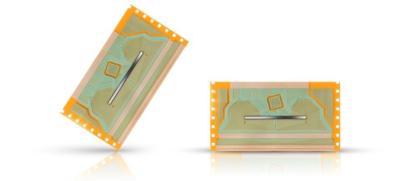Visionox developed the world's first AMOLED driver IC with embedded RRAM
Visionox announced that together with Sunrise Display Microelectronics and Hefei Reliance Memory it has developed the world's firs AMOLED device driver that is powered by RRAM memory.
All AMOLED drivers on the market use a combination of SRAM memory, OTP (one-time programmable memory) and external Flash memory (for non-volatile memory), mostly to perform the Demura compensation function. The RRAM memory enables lower cost of production, higher efficiency - and smaller area.
Tianyi Micro to co-develop OLED microdisplay backplanes with Tower Semiconductor
China-based display IC developer Tianyi Micro announced a strategic cooperation with Israel-based foundry Tower Semiconductor, to develop next-generation OLED microdisplay backplanes.
The new driver ICs will be based on Tower’s unique 180nm and 65nm dedicated micro display backplane process flows, supporting current-driven (as opposed to voltage-driven) OLED pixel designs.
Magnachip reports its Q4 2022 financial results, revenues are down due to supply shortages
OLED driver IC developer MagnaChip announced its financial results for Q4 2022, with revenues of $61 million, down 44.7% compared to Q4 2021, primarily due to severe 28nm wafer shortages.

In full-year 2022, the company reports revenues of $337.7 million, down 28.8% from 2021. The company does report, however, taht it signed a Tier-1 panel customer outside of Korea, and it qualified two new foundries to strengthen its supply chain. During the last quarter, MagnaChip successfully qualified two OLED projects with its two leading panel customers and expect to begin shipping at the end of this quarter.
MagnaChip announces its first power management IC designed for OLED IT displays
OLED driver IC developer MagnaChip has launched its first power management integrated circuit (PMIC) specifically designed for IT devices with OLED displays.

A PMIC supplies power to electronic devices, and it is an important component in mobile devices to optimize power consumption. The newly-designed PMIC communicates with a system by using an Inter-Integrated Circuit (I2C) interface and can control functions such as output voltage control, ON/OFF block, output voltage sequence management, and more. It supports variable refresh rate OLED displays, from 60Hz to 240Hz.
Magnachip says it shipped over 730 million OLED drivers since 2007
OLED driver IC developer MagnaChip started shipping OLED display drivers in 2007, and the company announced yesterday that it has shipped over 730 million units since.

MagnaChip recently expanded its business area into new markets such as foldable smartphones, automotive displays and OLED TVs. The company expects the OLED DDIC market to grow rapidly in the next new years and quotes Omdia's estimate of 1.2 billion OLED panels shipped in 2028.
BOE's AMOLED production volume still low as the company faces IC supply constraints
In February 2022 it was reported that BOE failed to secure enough driver ICs, and had to reduce its AMOLED production volume. According to new reports from Korea, BOE is still facing IC supply issues, and it is estimated that it AMOLED volume will remain lower than expected at least until May.
The new report suggests that beyond the IC supply constraints, BOE is also suffering from low yields at its new B12 fab in Chongqing, lower than what it hoped for in 2022.
Magnachip starts mass producing DDIC OLED TV drivers
Magnachip announced that it has started mass-producing OLED display driver integrated circuit (OLED DDIC) for OLED TVs.

Magnachip says that its new DDIC supports a maximum of 960 source output channels and can be coupled with a Chip On Film (COF) package and a high-speed serial interface. The new driver is based on enhanced high-voltage analog process technology. The chips supports various resolutions between HD (1,366 x 768) and UHD 4K (3,840 x 2,160), and can support panel sizes ranging from 40 to 80 inches.
ETNews: BOE reduces OLED production due to chip supply shortage
According to ETNews, BOE reduced its AMOLED production for Apple to about 2-3 months in February and March, down from around 9-10 million units it originally planned to produced, as the company failed to secure enough driver ICs.

ETNews says that LX Semicon (previously Silicon Works) cannot supply BOE with enough driver chips. Most of the company's chips will be supplied to LG's OLED panels.
MagnaChip is developing next-gen OLED ICs for automotive displays
OLED driver IC developer MagnaChip announced that it is expanding its OLED IC product lineup as it is developing a next-generation OLED DDIC for automotive displays.

Magnachip is developing an OLED DDIC for automotive based on the 40nm process technology, targeting center stack displays and instrument cluster displays. The company plans to supply the new product to premium European car manufacturers in the first half of 2023. The new driver will support a wide range of resolutions (including FHD) and will work with both rigid and flexible OLED displays.
The worldwide component shortage is affecting the OLED industry
In recent months, the world is suffering from a serious semiconductor component shortage, due to several reasons that all seemed to have join forces - increased demand for IT products due to the pandemic, extreme weather conditions in the US and Asia, the US-China trade war, employee shortages, and the power grid problems that China is facing.

This semiconductor supply and demand crisis is affecting the global OLED industry. Some display makers cannot ship their displays - not because of OLED production problems, but because they cannot get enough driver ICs.
Pagination
- Page 1
- Next page


